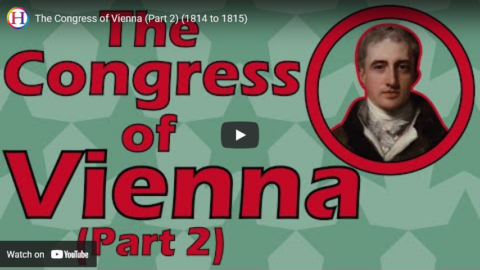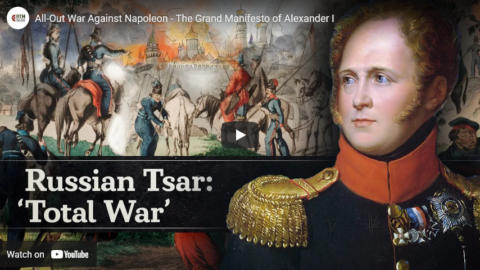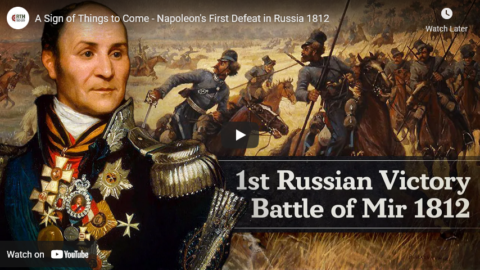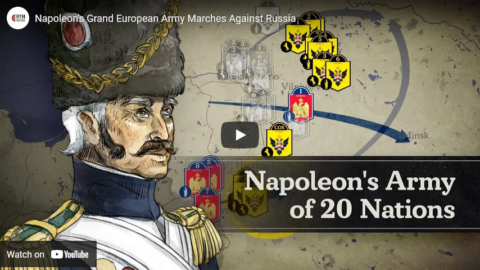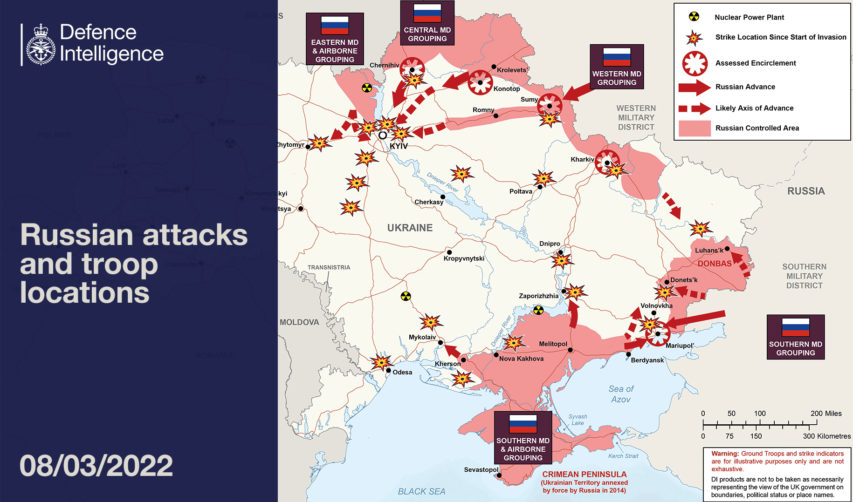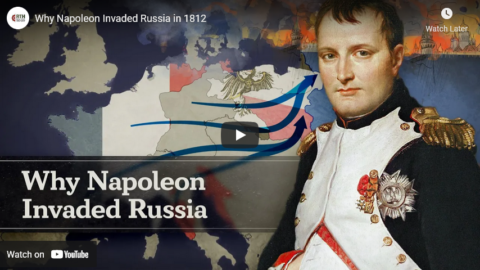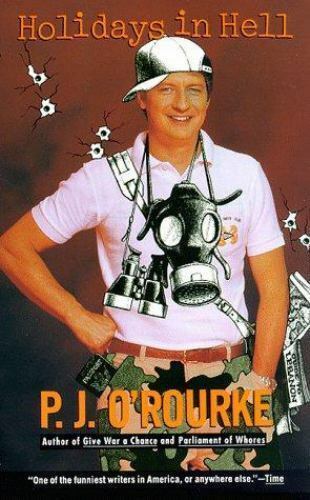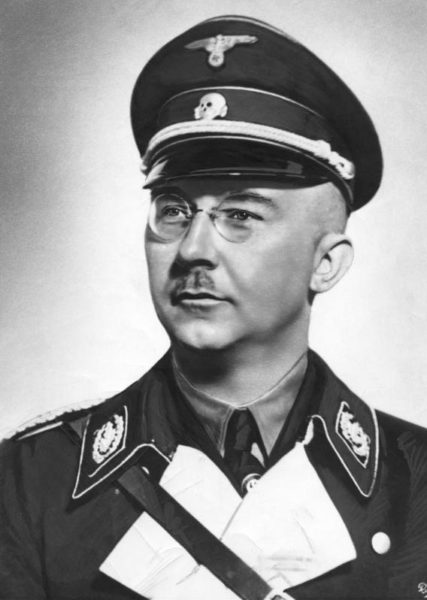World War Two
Published 1 May 2022As the SS continues to crack down on the uprising in the Warsaw Ghetto, Great Britain and the US decide not to help Jewish refugees.
(more…)
May 2, 2022
Dead Refugees Are Better Than New Immigrants – WAH 058 – May 1, 1943
April 25, 2022
The Jews Fight Back – WAH 057 – April 24, 1943
World War Two
Published 24 Apr 2022The war against Naziism is escalating on all fronts — in the War Against Humanity the main battleground is now the Warsaw Ghetto.
(more…)
April 17, 2022
Kursk – The Next Great Battle? – WW2 – 190 – April 16, 1943
World War Two
Published 16 Apr 2022The Allies have one chance left to catch the Axis forces in Tunisia before they can reach the Tunis defences; in the USSR both the Axis and Soviets are making plans for a fight near Kursk; and in the skies, in the South Pacific a Japanese aerial offensive ends and Yamamoto himself flies off to congratulate his pilots.
(more…)
April 15, 2022
The West Sacrifices Poland to the Soviets – WAH 056 – April 1943, Pt.1
World War Two
Published 14 Apr 2022There are cracks in the alliances on both sides. Hitler’s allies are refusing to do his every bidding, and the revelations about the Soviet massacre of Poles in Katyn has set a wedge between Poland and the USSR.
(more…)
April 4, 2022
The Congress of Vienna (Part 2) (1814 to 1815)
Historia Civilis
Published 2 Apr 2022Patreon | http://historiacivilis.com/patreon
Donate | http://historiacivilis.com/donate
Merch | historiacivilis.com/merch
Mailing List | http://historiacivilis.com/mailinglist
Twitter | http://historiacivilis.com/twitter
Website | http://historiacivilis.comSources:
Eric Hobsbawm, The Age of Revolution, 1789-1848
Adam Zamoyski, Rites of Peace: The Fall of Napoleon and the Congress of Vienna
Richard J. Evans, The Pursuit of Power: Europe 1815-1914
Wolfram Siemann, Metternich: Strategist and Visionary
A. Wess Mitchell, The Grand Strategy of the Habsburg Empire
Robert K. Massie, Dreadnought: Britain, Germany, and the Coming of the Great War
Adam Hochschild, Bury the Chains: Prophets and Rebels in the Fight to Free an Empire’s Slaves
Harry Dickinson, Public Opinion and the Abolition of the Slave Trade | https://bit.ly/2XRMLJC
The History of Parliament: The 5th Parliament of the United Kingdom | https://www.historyofparliamentonline…Music:
“Past,” by Nctrnm
“While She Sleeps (Morning Edit),” by The Lights Galaxia
“Mell’s Parade,” by Broke For Free
“Day Bird,” by Broke For Free
“Thomas Neutrality,” by Enrique Molano
“Infados,” by Kevin MacLeod
“The House Glows (With Almost No Help),” by Chris Zabriskie
“Hallon,” by Christian Bjoerklund
April 1, 2022
Denazify the World. Resist Now. – WAH 055 – March 1943, Pt. 2
World War Two
Published 31 Mar 2022The Nazis and the Soviets discover each other’s atrocities, while resistance is on the rise, and a half-dormant conspiracy against Hitler comes back to life to take his life.
(more…)
March 25, 2022
All-Out War Against Napoleon – The Grand Manifesto of Alexander I
Real Time History
Published 24 Mar 2022Get Nebula and CuriosityStream in a great bundle deal: https://curiositystream.com/realtimeh…
In the beginning of Napoleon’s invasion of Russia, the Russian Tsar Alexander I was under pressure to rally his people. A month into the campaign he declared the The Patriotic War (Отечественная война) to fight back Napoleon — who was already having serious supply issues and a deteriorating logistics network.
» SUPPORT US ON PATREON
https://patreon.com/realtimehistory» THANK YOU TO OUR CO-PRODUCERS
John Ozment, James Darcangelo, Jacob Carter Landt, Thomas Brendan, Kurt Gillies, Scott Deederly, John Belland, Adam Smith, Taylor Allen, Rustem Sharipov, Christoph Wolf, Simen Røste, Marcus Bondura, Ramon Rijkhoek, Theodore Patrick Shannon, Philip Schoffman, Avi Woolf,» SOURCES
Boudon, Jacques-Olivier. Napoléon et la campagne de Russie en 1812. 2021.
Chandler, David. The Campaigns of Napoleon, Volume 1. New York 1966.
Clausewitz, Carl von. Hinterlassene Werke des Generals Carl von Clausewitz über Krieg und Kriegsführung. Siebenter Band, Der Feldzug von 1812 in Rußland, der Feldzug von 1813 bis zum Waffenstillstand und der Feldzug von 1814 in Frankreich. Berlin 1835.
Geschichte der Kriege in Europa seit dem Jahre 1792 als Folgen der Staatsveränderung in Frankreich unter König Ludwig XVI., neunter Teil, 1. Band. Berlin 1839.
Hartwich, Julius von. 1812. Der Feldzug in Kurland. Nach den Tagebüchern und Briefen des Leutnants Julius v. Hartwich. Berlin 1910.
Holzhausen, Paul. Die Deutschen in Russland 1812. Leben und Leiden auf der Moskauer Heerfahrt. Berlin 1912.
Lieven, Dominic. Russia Against Napoleon. 2010.
Mikaberidze, Alexander. “The Lion of the Russian Army”: Life and Military Career of General Prince Peter Bagration 1765-1812. PhD Dissertation, 2003.
Rey, Marie-Pierre. L’effroyable tragédie: une nouvelle histoire de la campagne de Russie. 2012.
Robson, Martin. A History of the Royal Navy: the Napoleonic Wars. 2014.
Tagebuch des Königlich Preußischen Armeekorps unter Befehl des General-Leutnants von Yorck im Feldzug von 1812. Berlin 1823.
Zamoyski, Adam. 1812: Napoleon’s Fatal March on Moscow. 2005.
Безотосный В. М. Россия в наполеоновских войнах 1805–1815 гг. (Москва: Политическая энциклопедия, 2014)
Отечественная война 1812 года. Энциклопедия (Москва: РОССПЭН, 2004)» OUR STORE
Website: https://realtimehistory.net»CREDITS
Presented by: Jesse Alexander
Written by: Jesse Alexander
Director: Toni Steller & Florian Wittig
Director of Photography: Toni Steller
Sound: Above Zero
Editing: Toni Steller
Motion Design: Toni Steller
Mixing, Mastering & Sound Design: http://above-zero.com
Digital Maps: Canadian Research and Mapping Association (CRMA)
Research by: Sofia Shiogorova, Jesse Alexander
Fact checking: Florian WittigChannel Design: Simon Buckmaster
Contains licensed material by getty images
Maps: MapTiler/OpenStreetMap Contributors & GEOlayers3
All rights reserved – Real Time History GmbH 2022
March 18, 2022
A Sign of Things to Come – Napoleon’s First Defeat in Russia 1812
Real Time History
Published 17 Mar 2022» SUPPORT US ON PATREON
https://patreon.com/realtimehistoryThe Battle of Mir in 1812 was the first battle of Napoleon’s invasion of Russia. Polish Uhlans ride right into a trap set by Platov’s Cossacks and under the Russian summer sun a cavalry skirmish ensues.
» THANK YOU TO OUR CO-PRODUCERS
John Ozment, James Darcangelo, Jacob Carter Landt, Thomas Brendan, Kurt Gillies, Scott Deederly, John Belland, Adam Smith, Taylor Allen, Rustem Sharipov, Christoph Wolf, Simen Røste, Marcus Bondura, Ramon Rijkhoek, Theodore Patrick Shannon, Philip Schoffman, Avi Woolf,» SOURCES
Boudon, Jacques-Olivier. Napoléon et la campagne de Russie en 1812. 2021.Chandler, David. The Campaigns of Napoleon. 1978.
Dujil, Nicolas. “Les armées russes en 1812”, in Rey, Marie-Pierre and Thierry Lentz, eds. 1812, la campagne de Russie. 2012.
Kagan Frederick. Russia’s Wars with Napoleon 1805-1815. The Military History of Tsarist Russia (NY.: Palgrave, 2002).
Lieven, Dominic. Russia Against Napoleon. 2010.
Mikaberidze, Alexander. “The Lion of the Russian Army”: Life and Military Career of General Prince
Peter Bagration 1765-1812. PhD Dissertation, 2003.
Rey, Marie-Pierre. L’effroyable tragédie : une nouvelle histoire de la campagne de Russie. 2012.
Zamoyski, Adam. 1812: Napoleon’s Fatal March on Moscow. 2005.
[Other Russian-language sources listed on the YouTube description]
» OUR STORE
Website: https://realtimehistory.net»CREDITS
Presented by: Jesse Alexander
Written by: Jesse Alexander
Director: Toni Steller & Florian Wittig
Director of Photography: Toni Steller
Sound: Above Zero
Editing: Toni Steller
Motion Design: Toni Steller
Mixing, Mastering & Sound Design: http://above-zero.com
Digital Maps: Canadian Research and Mapping Association (CRMA)
Research by: Sofia Shirogorova, Jesse Alexander
Fact checking: Florian WittigChannel Design: Simon Buckmaster
Contains licensed material by getty images
Maps: MapTiler/OpenStreetMap Contributors & GEOlayers3
All rights reserved – Real Time History GmbH 2022
Schindler’s First Rescue Mission – WAH 054 – March 1943, Pt. 1
World War Two
Published 17 Mar 2022In the weeks after Goebbels’ Sportpalast speech, we realize that Total War might mean an apocalyptic end for Germany, with Hitler’s blessing. No wonder that some Germans are looking to end Hitler before he ends them, and what a blessing that at least one Nazi with influence on the fate of thousands of Jews turns out to have a heart and soul.
(more…)
March 12, 2022
Napoleon’s Grand European Army Marches Against Russia
Real Time History
Published 11 Mar 2022Get Nebula and CuriosityStream in a great bundle deal: https://curiositystream.com/realtimeh…
When Napoleon marched his Grande Armée into Russia in 1812, he had assembled the biggest army in modern European history. Only half of his troops came from territories of the expanded French Empire. Tens of thousands of troops also came from Poland, Prussia, Austria, and the German States as well as Southern Europe.
» SUPPORT US ON PATREON
https://patreon.com/realtimehistory» THANK YOU TO OUR CO-PRODUCERS
John Ozment, James Darcangelo, Jacob Carter Landt, Thomas Brendan, Kurt Gillies, Scott Deederly, John Belland, Adam Smith, Taylor Allen, Rustem Sharipov, Christoph Wolf, Simen Røste, Marcus Bondura, Ramon Rijkhoek, Theodore Patrick Shannon, Philip Schoffman, Avi Woolf,» SOURCES
Boudon, Jacques-Olivier. Napoléon et la campagne de Russie en 1812. 2021.
Brun, Jean-François. “Le cheval dans la Grande Armée“, Revue historique des armées (249), 2007.
Del Negro, Piero. “Les Italiens dans la Grande Armée. La campagne de Russie et le patriotisme italien“, Revue historique des armées (250), 2008.
Elting, John. Swords Around a Throne: Napoleon’s Grande Armée. 1997.
Lieven, Dominic. Russia Against Napoleon. 2010.
Nieuwazny, Andrzej. “Les Polonais de la Grande Armée“, in Rey, Marie-Pierre and Thierry Lentz, eds. 1812, la campagne de Russie. 2012.
Rey, Marie-Pierre. L’effroyable tragédie: une nouvelle histoire de la campagne de Russie. 2012.
Zamoyski, Adam. 1812: Napoleon’s Fatal March on Moscow. 2005.» OUR STORE
Website: https://realtimehistory.net»CREDITS
Presented by: Jesse Alexander
Written by: Jesse Alexander
Director: Toni Steller & Florian Wittig
Director of Photography: Toni Steller
Sound: Above Zero
Editing: Toni Steller
Motion Design: Toni Steller
Mixing, Mastering & Sound Design: http://above-zero.com
Digital Maps: Canadian Research and Mapping Association (CRMA)
Research by: Jesse Alexander
Fact checking: Florian WittigChannel Design: Simon Buckmaster
Contains licensed material by getty images
Maps: MapTiler/OpenStreetMap Contributors & GEOlayers3
All rights reserved – Real Time History GmbH 2022
March 9, 2022
By all means, decry the Russian invasion, but also scrutinize Ukraine’s government
In The Critic, Mark Almond says we need to keep a clear perspective about the war in Ukraine, to condemn Russian aggression certainly, but also to see as clearly as we can what kind of government is in charge of defending Ukraine:
“Know Your Enemy” is a standard invocation in wartime. But, if clear-eyed appreciation of an opponent and his intentions is obviously necessary, shouldn’t “Know Your Ally” be equally imperative?
Even when war has become a spectator sport for Westerners, rejoicing in killing Putin with their mouths in cyberspace and joyously kicking Russian cripples out of the paralympics, there is a real conflict going on which is horrendous for Ukrainians, which also has serious implications even for us off-shore islanders, as well as Europe as a whole.
Romanticising our chosen side and vilifying their foes are natural reactions, but fairy-tale versions of conflict often disguise the flaws of the allies even if they pale by comparison with the vices of the invader.
Think how in 1914 “Plucky Little Belgium” was portrayed as a damsel in distress about to be raped by a literally monstrous Hun. But until August, 1914, Belgium’s place on the scale of victimhood was decidedly at the perpetrator end. The horrific exploitation of the Belgian Congo’s population as slaves to King Leopold’s greed — fictionalised by Conrad’s Heart of Darkness — had been exposed by Sir Roger Casement and E.D. Morel, who both rejected the defence of Belgium.
Casement went over the top to side openly — and suicidally with Imperial Germany — while Morel went to prison for urging men not to join up. They were deeply mistaken about Germany, but they did know something about our Belgian ally’s moral record.
Wartime Polish resistance to the Nazis and service in the RAF is fondly remembered in this country and rightly so, but the Polish junta in 1939 was as militarily incompetent as their Argentinian counterparts in 1982. The courage of ordinary Polish soldiers should not make people forget the regime which had colluded with Hitler against the Czechs in 1938. Our other ally, Stalin, subsequently “liberated” the Poles in his inimitable way. The trade-offs and alliances that defeated the Nazis were extremely ugly.
Turning to Ukraine today, it is easy — and heart-warming — to get swept away by the pictures of Ukrainian soldiers fight back against the vast Russian army or civilians blocking the path of the “Russian steamroller” (so admired in 1914 by the British public). President Zelensky is by far the best president Ukrainians have had since independence in 1991. That might seem a back-handed compliment when we consider how low his predecessors set the bar. But the focus in Western media on this real life Charlie Chaplin defying the Kremlin’s “Great Dictator” makes good “reality tv” but overlooks the actual power-structures in Ukraine.
March 4, 2022
Why Napoleon Invaded Russia in 1812
Real Time History
Published 3 Mar 2022» SUPPORT US ON PATREON: https://patreon.com/realtimehistory
When Napoleon’s Grande Armée crossed the Nemen river into the Russian Empire in 1812, the die had been cast. In the years between the peace of Tilsit and the war against Russia, Tsar Alexander I and Emperor Napoleon had praised each other and Russia had even joined the continental blockade of Napoleon’s arch enemy Great Britain. Still, in 1811 both sides saw war as inevitable.
» THANK YOU TO OUR CO-PRODUCERS
John Ozment, James Darcangelo, Jacob Carter Landt, Thomas Brendan, Kurt Gillies, Scott Deederly, John Belland, Adam Smith, Taylor Allen, Rustem Sharipov, Christoph Wolf, Simen Røste, Marcus Bondura, Ramon Rijkhoek, Theodore Patrick Shannon, Philip Schoffman, Avi Woolf,» SOURCES
Boudon, Jacques-Olivier. Napoléon et la campagne de Russie en 1812. 2021.
Lieven, Dominic. Russia Against Napoleon. 2010.
Rey, Marie-Pierre. L’effroyable tragédie : une nouvelle histoire de la campagne de Russie. 2012.
Zamoyski, Adam. 1812: Napoleon’s Fatal March on Moscow. 2005.» OUR STORE
Website: https://realtimehistory.net»CREDITS
Presented by: Jesse Alexander
Written by: Jesse Alexander
Director: Toni Steller & Florian Wittig
Director of Photography: Toni Steller
Sound: Above Zero
Editing: Toni Steller
Motion Design: Toni Steller
Mixing, Mastering & Sound Design: http://above-zero.com
Digital Maps: Canadian Research and Mapping Association (CRMA)
Research by: Jesse Alexander
Fact checking: Florian WittigChannel Design: Simon Buckmaster
Contains licensed material by getty images
All rights reserved – Real Time History GmbH 2022
From the comments:
Real Time History
10 hours ago» SUPPORT US ON PATREON: https://patreon.com/realtimehistory
Dear RTH supporters and new time viewers,
as I am writing this the Russian invasion of Ukraine is a week old. Our thoughts are with our friends and family in Ukraine as we watch this historic tragedy unfold before our eyes. At the same time we have been working hard to launch our series about Napoleon’s Invasion of Russia in 1812. Most of you will know us for our approach to military history, we don’t just follow the “great men of history” and take the armchair general position that is just moving abstract markers on a map. To the best of our abilities, we are showing the ugly truth of war and the cost for the people on the ground. This will be no different for our Napoleon series.
At the end of this series, you will see that the Russian Empire emerges victorious and indeed 1812 is called “The Patriotic War” in Russia. We began work on the series long before the current phase of the war began, and, as those of you who are familiar with our work already know, this series is in no way a statement of support for the actions of the current Russian government. In our series, we will show how the 1812 campaign was another step towards the totalization of warfare as a whole. We will also show how the question of independence for non-Russians in the Russian Empire was already a thorn in Russia’s side over 200 years ago.
War is never glorious and after studying the 1812 campaign, we can say with certainty that this war was one of the ugliest wars in history. The cost for the common people between Moscow and the Berezina was immense and so was the cost for the French and non-French soldiers in the Grande Armée – and of course for the Russian soldiers too.
Lastly, current events always shape our understanding of history. A crude, perverted version of history has even been used by Vladimir Putin to justify this war of aggression against Ukraine. Undoubtably, this current war will also cause us to see 1812 in a different light. Napoleon’s Invasion of Russia is rightfully considered as one of the most important events in European history and it needs to be remembered for generations to come. With our series, we hope we can contribute to this understanding.
Thank you for your support and keeping a critical view of history alive with us. No to war!
Florian Wittig and the entire Real Time History team
February 17, 2022
P.J. O’Rourke’s Holidays in Hell
Arthur Chrenkoff remembers the first of P.J. O’Rourke’s books he discovered in Australia after his family emigrated from Poland:
I haven’t heard of this O’Rourke fellow, but Holidays in Hell is a great title. I’ve always enjoyed reading about other countries, and the concept of travelling to war zones and other shitholes seems like a fertile territory for satire. Plus, as I see in the table of contents, O’Rourke had travelled to Poland a year before my family had left it. We were roughly in the same place at the same time. Now I just have to find out what this zany American thought of my homeland. I’m sold. So is the book.
It was a 50 cents well spent. I have the book next to my keyboard as I’m typing these words. It’s the first British edition, printed in in 1989 by Picador, so it would have been four or five years old when I bought it. It doesn’t look like it has aged at all since then. Maybe the paper is a tad more yellow but that’s about it. “What do they do for fun in Warsaw” is on page 83 (in the table of contents, the city is misspelled “Warshaw”, which actually makes it closer to the original Warszawa, the English “sh” being the same as the Polish “sz” sound – don’t say you didn’t learn anything new today). It was glorious, capturing with all of O’Rourke’s sardonic majesty the death rattles of the system that would collapse only three years later (not that any of us foresaw it). “I didn’t see any Evil Empire,” wrote P J, “that would have been too interesting. Communism doesn’t really starve or execute that many people. Mostly it just bores them to death”.
I enjoyed the rest of the book too, from civil war-torn Lebanon to divided Central America – the rightist El Salvador and the commie Nicaragua. Over the next few years I feasted on Republican Party Reptile. Parliament of Whores and Give War a Chance. I even managed to get to O’Rourke’s original non-political writing, Modern Manners and The Bachelor Home Companion, which I found just as funny if also less depressing than politics. Then I read all the new books as they came out. While it’s impolite to speak ill of the dead, I have found P J O’Rourke after 2000 increasingly struggling to be funny. His last output over the past six or so years as this “Republican Party reptile” and arch-libertarian ended up voting for Hillary Clinton because he didn’t like Donald Trump was cringeworthy and sad to read, which is did less and less of, until I did none at all. But it doesn’t change the fact that when P J was good – in the 1980s and 90s – he was a god. There was no one and nothing like him. He singlehandedly made right-of-centre sensibilities hip and the left ridiculous, which is the best weapon against those who fancy themselves too much.
At this point in time I should probably apologise for lying – P J O’Rourke did not save my life, though that sounded a lot sexier than any other title I could think of. What P J had done for me, however, was just as important: he set me on the right path.
The line from growing up in communist Poland forty years ago to The Daily Chrenk today might seem pretty straightforward in hindsight, but for a while in the early 1990s it got somewhat twisted and crooked, as lines tend to do when you attend university. Not only was I suddenly exposed in my Arts degree (majoring in Government, or political science, with a minor in History) to 50 Shades of Left, but I had embarked on wide-ranging reading spree of my own (nothing wrong with that; I still do), involving writers and topics as diverse as Noam Chomsky, the JFK assassination conspiracy theories, Robert Anton Wilson and Edmund Burke. Being a late developer, I went through the teenage phase of hating everyone and everything while in my early 20s. I was alone and homeless; not really angry but cynical and disenchanted.
At Samizdata, Johnathan Pearce also regrets O’Rourke’s death:
I met Mr O’Rourke about a decade ago, in what was the aftermath of the 2008 financial smash. He was charming company (my wife was bowled over by him – you have to watch these silver-tongued Irishmen) and retained the fizz that I recall from his coruscating book, Republican Party Reptile. I read that, I think, in around 1989, and then got my hands on anything he wrote. When he became a traveling correspondent for Rolling Stone magazine (a fact that today strikes one as impossible, such is the tribalism of our culture), I followed his columns closely. Parliament of Whores, written in the early 1990s and on the cusp of the Bill Clinton decade, stands the test of time as a brilliantly funny takedown of Big Government. Then came classics such as Eat The Rich and All The Trouble In The World.
I don’t quite think he kept the standard of searing wit + commentary at that level into the later 90s and into the current century. He did “serious stuff” with an amusing turn, such as a fine book about Adam Smith […] and could turn on the brilliance, but I think some of the energy had fallen off. He was a Dad with all the responsibilities that brings, and younger and less funny and more aggressive voices began to dominate the noise level in the public square. (Or maybe that is a sign that I am getting old, ahem.) O’Rourke, to the anger of some, wasn’t a Trump fan, and said so. He moved quite more explicitly libertarian, having a gig at the CATO Institute think tank. By his early 70s, I did not read or hear much of his doings, and that was a shame in the age of Greta, Cancel Culture, “Save the NHS”, Great Resets, Chinese nastiness and the Keto Diet. (I am kidding slightly about the last point.)
P J O’Rourke’s death saddens me as much as did that of two other fine men whom I met over the years and who died from cancer over the past couple of years: Brian Micklethwait and Sir Roger Scruton. They were all very different men, but they shared a common love of liberty, a mischievous wit and a hatred of cant.
I think the first of his books I ever read was Republican Party Reptile, and my copy got a bit dog-eared from being lent out to many friends and acquaintances over the next few years. As I understand it, O’Rourke had children late in life, and it may have been one of the reasons that some of the character and energy of his earlier works are somewhat lacking in writings from the last fifteen years or so … there are few activities that can absorb energy like caring for young children (I love seeing my grand-nieces when they visit, but I’m totally knackered by the time we’re waving goodbye).
February 16, 2022
Germany’s dual economy during WW2 (and why Himmler would have succeeded Hitler if the Nazis had won WW2)
At Founding Questions, Severian looks at the way the Nazi economy was actually two entities — the “wartime” economy and the effectively separate SS economy under the control of Heinrich Himmler:
Here’s where the Nazis really blew it. “Nazism” should really be called “Hitlerism”, as it was a true cult of personality; there was no ideology without the specific individual man. That’s the tension at the heart of any collectivist ideology — somebody’s got to be The Boss, however temporarily — but Nazi Germany suffered it worse than most. Had the Nazis won the war, the bloodbath at the top would’ve been as spectacular per capita as the war itself. As thoroughgoing Social Darwinists, they only had one possible principle of succession …
Let’s provisionally call that the first consequence of an ideology in power: The personal is the political and vice versa. That seems trite, I realize, but I’m putting it here to emphasize its literalness – in an ideological state, building your own “affinity”, Bastard Feudalism-style, just IS politics. There’s no other possible political activity. And as much as the Nazis seemed to have screwed it up by going all in on the Fuhrerprinzip at the very top, their out-and-proud Organizational Darwinism (for lack of a better term) made them super-efficient at the lower levels.
Let’s bring Khrushchev back in. In many ways, he’s the Soviet Himmler. He was one of Stalin’s right hand men throughout the war, but somehow didn’t get tagged as a major player in the succession crisis until it was too late for all the other contenders for the purple to take effective countermeasures. In the same way, Hitler did announce a successor, sort of. In fact he did it twice: Before the war, it was Rudolf Hess; during the war, Hermann Goering. Neither of those guys had anything approaching the power Himmler had, but like Khrushchev, his personality was such that the other bigshots couldn’t help overlooking him. Just as the rest of the Politburo couldn’t wrap their heads around the idea of this uncouth quasi-Ukrainian peasant being a major threat, so the rest of the Nazi leaders couldn’t help seeing Himmler as this fussy little file clerk.
It’s a hell of a trick, and I’ll admit, I’m buffaloed. Even if Himmler (Khrushchev) was one hell of an actor, and the egos on the other top Nazis (Soviets) were gravity-defying, they still should’ve been able to see that this fussy little file clerk had some seriously hard boys working for him. Reinhard Heydrich was as ruthless a fuck as was ever born, and Himmler kept him in check. Ditto barbarians like Odilo Globocnik and Erich von dem Bach-Zelewski — they don’t come any nastier than those two, yet Himmler managed them easily. What other conclusion can you possibly draw about Himmler, other than that he was nastier than all of them put together? And yet, apparently, nobody did …
The only explanation for this that I can think of is the Nazis’ ideologization of governmental structures. As opposed to the Soviet experience, where the Party and the Bureaucracy were supposed to be, and often actually were, distinct. After some disastrous experiments with demoting technical experts to field hands, and vice versa, the Russian Communists learned that ideological correctness and “soviet power” does not, in fact, obviate the need for stuff like math. (See also: Mao’s backyard blast furnaces). So the Soviets made sure to separate what they called the “technical intelligentsia” from the Party. The head honcho at Gosplan, Gossnab, etc. would be a Party hack from way back, of course, but the actual brainworkers wouldn’t be. I don’t know just how many of them had Party membership cards, or if any of them did, but nobody I know of rose through the Party’s ranks via Gosplan.
Once a Gosplanner, always a Gosplanner. The technical intelligentsia got all kinds of perks in the Soviet system, but one thing they did not do was get perks inside the Party. You can be a technical expert, or you can be an up-and-coming Party man, but you can’t be both.
The Nazis did the exact opposite of that. The way the Third Reich actually functioned is still opaque in a lot of ways (especially to non-specialists), and of course the pressures of wartime forced a lot of ad hoc measures, but it seems like the SS was supposed to be a sort of All-Purpose Expert Corps. Not only did they have their own army and intelligence service, but they had their own economy — the brief history of the Third Reich makes a lot more sense when you realize that half or more of the official Reich economy was hamstrung by the informal but very real SS economy, operating largely (but far from exclusively) through the labor camps.
Indeed, the SS had their own administration. As incredible as it seems, the Nazis had no grand plan for what to do once they’d conquered Europe. Himmler did, at least as far as the East was concerned, and he tried his damnedest to put it into action in Poland (which is why the General Government was so legendarily brutal). Hitler apparently thought in terms of Germany’s lost late 19th century colonies, when he bothered to think about it at all … which wasn’t often. In his typical Fuhrer-riffic style, he just ignored the problem, trusting to Organizational Darwinism to sort it out …
… which is where the All-Purpose Experts of the SS stepped in. The General Government, for instance, was headed by a civilian lawyer, Hans Frank, but the day to day governance largely fell to the SS, because that’s who stepped up. Poland was an occupied zone, with vital war industries, but it was far behind the front for most of the war; the army couldn’t waste vital manpower garrisoning it. Thus the SSPF (the SS and Police Leader) stepped in, drawing manpower as needed from a wide variety of sources — the camp guards, the Wehrmacht (when garrison troops were available, and when they could wrangle them from the various army commanders), the civilian police, the “General SS”, and so on.
The details aren’t nearly as important as the big picture, which is: Unlike the technical intelligentsia in the Soviet Union, members of the SS could climb to the highest ranks of the Party. Indeed they were expected to: the SS was rapidly becoming a Party-within-the-Party at the outbreak of the war, not least because Himmler awarded a “ceremonial” SS rank to anyone who mattered politically in the various departments. The savvier guys refused the “honor,” of course, because they didn’t want to be subordinate to Himmler, even ceremonially, but many didn’t. Which meant that had the Nazis won the war, not only would Himmler have been the next Fuhrer, but the SS would’ve closed ranks, essentially taking over The Party — they’d be the Inner Party, as opposed to the “mere Nazis” of the Outer Party.
January 28, 2022
The Warsaw Ghetto: The Jews Strike Back – WAH 51 – January 1943, Pt. 2
World War Two
Published 27 Jan 2022In early 1943 Nazi German propaganda minister Joseph Goebbels is preparing to rally the German people behind an unrestrained war — or “total war” as he puts it. It’s unclear what that means, Nazi Germany has long been waging an unrestrained war, and it seems that the United Nations alliance is now ready to do the same on Germany.
(more…)

